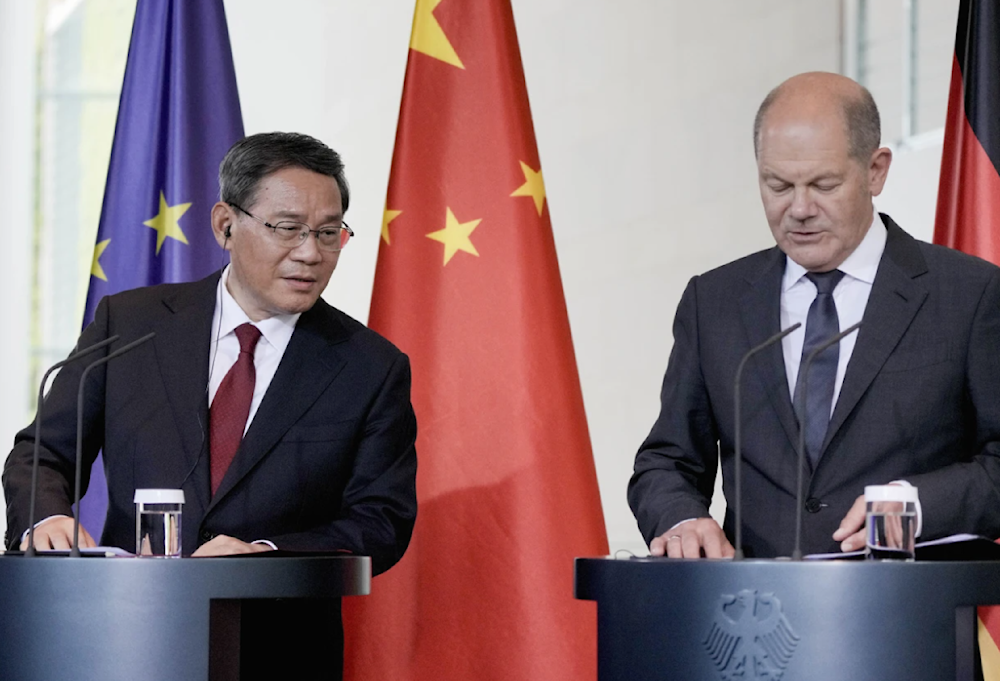German investment in China rises to record high: Reuters
According to the IW Institute, German firms have invested the same amount in China in the last three years as they did in the preceding six.
-

German Chancellor Olaf Scholz and Chinese Premier Li Qiang brief the media after government consultations of both countries at the chancellery in Berlin on June 20, 2023 (AP)
Reuters has obtained exclusive official Bundesbank data analyzed by the IW institute that indicates German direct investment in China surged by 4.3% last year to a new high of 11.9 billion euros ($12.7 billion), accounting for a larger percentage of the country's overall foreign investment.
The report raises worries that German corporations continue to invest extensively in China, despite the government's requests to minimize their exposure and the dramatic reduction in investment guarantees for the nation.
According to the IW Institute, German firms have invested the same amount in China in the last three years as they did in the preceding six.
However, German investments in China over the previous four years have been wholly funded by reinvested profits, and corporations have also withdrawn cash, presenting a more mixed picture.
IW economist Juergen Matthes stated in the report "We can assume that there remains a split between the few big companies and the majority of small and medium-sized enterprises."
"Other studies and anecdotal evidence support the thesis that some medium and small-sized businesses are seeking to reduce their engagement with China or even to exit entirely."
In the previous four years, the number of German enterprises abandoning or considering leaving the Chinese market has more than quadrupled to 9%, according to a poll published last month by the German Chamber of Commerce in China.
Overall, German foreign direct investment fell to 116 billion euros last year, down from nearly 170 billion euros in 2022, as Europe's largest economy was on the verge of recession, according to the IW research.
Last year, investment in China increased to 10.3% of Germany's total foreign investments, the highest level since 2014, while German direct investments in other Asian countries remained stable at approximately 8%.
Germany is in a difficult position. Despite its desire to limit its exposure to China, the nation remained its most important commercial partner for the ninth consecutive year in 2023, according to preliminary statistics office numbers.
Politicians in German Chancellor Olaf Scholz's coalition administration disagree on how far the danger of exposure to China should be lowered, with Scholz's Social Democrats (SPD) calling for less dramatic cutbacks than junior coalition allies the Free Democrats and the Greens.
A source close to the plans told Reuters in early February that Scholz will fly to China with a business group from April 15 to 16.
German FM describes German economy as an 'unfit man'
Finance Minister Christian Linder stated at the London School of Economics on Monday that Germany needs structural reforms to boost its competitiveness.
This came after Germany was declared by the IMF as having the weakest performance among large economies in the world and was labeled once again “the sick man of Europe”.
Linder objected to this label, stating that “some say Germany is the sick man of Europe, I don’t think so,” adding “we are an unfit man.” The “sick man” label was famously given to Germany by The Economist in 1999 as the country struggled with the challenges of reunification and reduced export demand.
The German economy has shrunk by 0.3% year-on-year in 2023, as energy costs have risen, global orders have dulled, and interest rates have increased.
The IMF expects the German economy to grow by only 0.9% in 2024, well below the 1.4% predicted for advanced economies.
Linder further stated that Germany is “healthy, but not in the best shape,” while comparing the German and UK economies which he believes “both are in a downturn.” He previously compared Germany to a “tired man” in need of a cup of coffee of structural reforms, last month.
In another comment made to Bloomberg, the minister announced that Germany’s economy would be ruined if it followed the UK out of the EU, stressing that the single market is of the “utmost importance” to Germany.

 4 Min Read
4 Min Read








